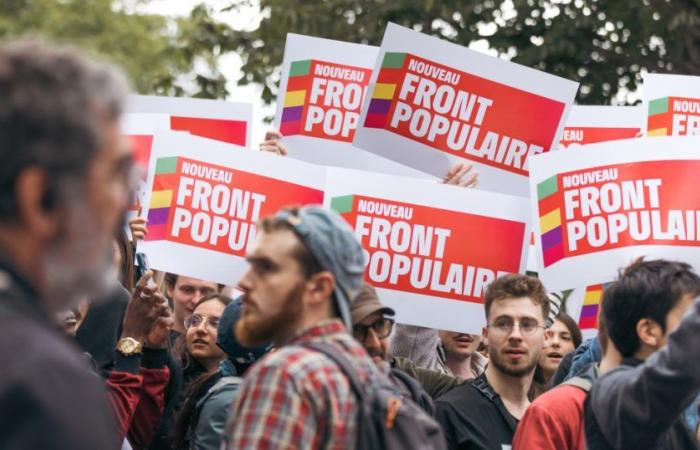
The New Popular Front (NFP) presented a costed economic program in record time, drawing all eyes to the billions in revenue needed to finance planned public spending. But how will these billions be distributed? Will the purchasing power of the French be affected, and if so in what direction?
The distributive analysis of the amounts mentioned shows that reducing inequalities is at the heart of the NFP agenda: taking from the (very) rich to give to the working and middle classes. If this program were implemented, the 50% of the poorest households would see their adjusted income increase by an average of 200 euros per month.
Just as we did for the National Rally program, it is possible, based on the macroeconomic figures provided by the New Popular Front, to measure the impact of the public policy measures announced on the standard of living of households. We can thus “reveal” the political choices of parties in terms of redistribution, beyond their speech.
To know the impact of a budgetary measure on the standard of living of households, it is necessary to observe how the additional revenue will be constituted (what tax, what tax will be increased?), and according to what pattern will the additional expenses be distributed (what benefit social, what public service will be developed?).
An immediately visible redistributive effect
The distributed national accounts published each year by INSEE provide the distribution of all the country’s revenue and expenditure by decile of standard of living, in very detail. We add the new revenues and expenditures planned for the NFP program.
The NFP provides for 25 billion in additional spending in 2024 (for additional revenues of 30 billion), and 100 billion in spending in 2025 (for additional revenues of the same order).
Tax measures focus on very high incomes and very high assets: tax on superprofits (+15 billion) and climate ISF (+15 billion), tax on golden inheritances (+17 billion), elimination of tax loopholes (+17 billion). +25 billion) or even increase in the upper bracket of income tax (+18 billion).
Expenditures are focused on the deployment of ecology (+9 billion), education, health (+18 billion) and public services in general (+52 billion), on the increase in civil servants’ salaries ( +17 billion), the revaluation of social benefits (+17 billion), without forgetting the immediate repeal of the pension reform and unemployment insurance (+3 billion).
These policies have a redistributive effect immediately visible in the graph below, which measures the expected monthly change in adjusted disposable income (after taxes, social benefits and public services) by standard of living decile.
The lowest 50% will benefit from an additional 200 euros each month
The poorest 50%, who have a standard of living of less than 1,930 euros per month for a single person (4,439 euros per month for a family of two adults and two children), will benefit from an additional 200 euros each month; the richest 10%, who have a standard of living of more than 3,490 euros per month for a single person (8,027 euros per month for a family of two adults and two children), will be called upon to contribute and will see their adjusted disposable income decrease, on average, by 652 euros per month.
But among these top 10%, the tax increase will actually be very concentrated on the top 5%, or even the top 1% – while the others will therefore contribute much less than these 652 euros per month.
Reduction of inequalities in living standards
We then break down this redistributive effect into four main categories of measures: those aimed at increasing primary income (increase in the minimum wage, cancellation of pension and unemployment insurance reforms, etc.), those aimed at collective spending (particularly for ecology) and the revaluation of public services (completely free public education, hiring of teachers, recruitment of caregivers, etc.), those aimed at sharing wealth (or monetary redistribution) which includes both taxation of production or wealth (climate ISF, tax on superprofits, etc.) and social benefits (“RSA young people”, increase in APL, etc.).
Measures to improve the value of work (in particular the increase in the minimum wage) mainly impact the lowest 30%, which concentrate more low-wage individuals.
Monetary redistribution increases the adjusted income of the first six deciles, therefore including the deciles at the center of the distribution, and reduces the adjusted income of the last decile by 12.4%.
The adjusted income of the poorest 10% thus increases by 1.9% thanks to the upgrading of public health and education services.
Public spending on health, education or ecology (thermal renovation, renewable energy production), if it benefits everyone, reduces inequalities in living standards because it represents a greater share of the income of the poorest than of the lowest. income of the richest.
The adjusted income of the poorest 10% thus increases by 1.9% thanks to the upgrading of public health and education services, and by 6.7% by investing in ecology and other public spending.
Overall, what is it? The drop in adjusted income for the highest incomes and assets in the country would certainly be marked (-652 euros per month on average for the richest 10%, but in reality concentrated on the richest 5% or even the 1%), but would finance the catch-up of the poorest (+210 euros, each month, for the poorest 10%) and the middle class (+160 euros monthly for households located in the middle of the income distribution).
The redistributive results of the NFP program are unequivocal: 80% of the population would see their standard of living increase, inequalities would be significantly and quickly reduced.
Elvire Guillaudeconomist (University of Paris 1 Panthéon-Sorbonne). Mathilde Viennot, economist. With the participation of General Interest





